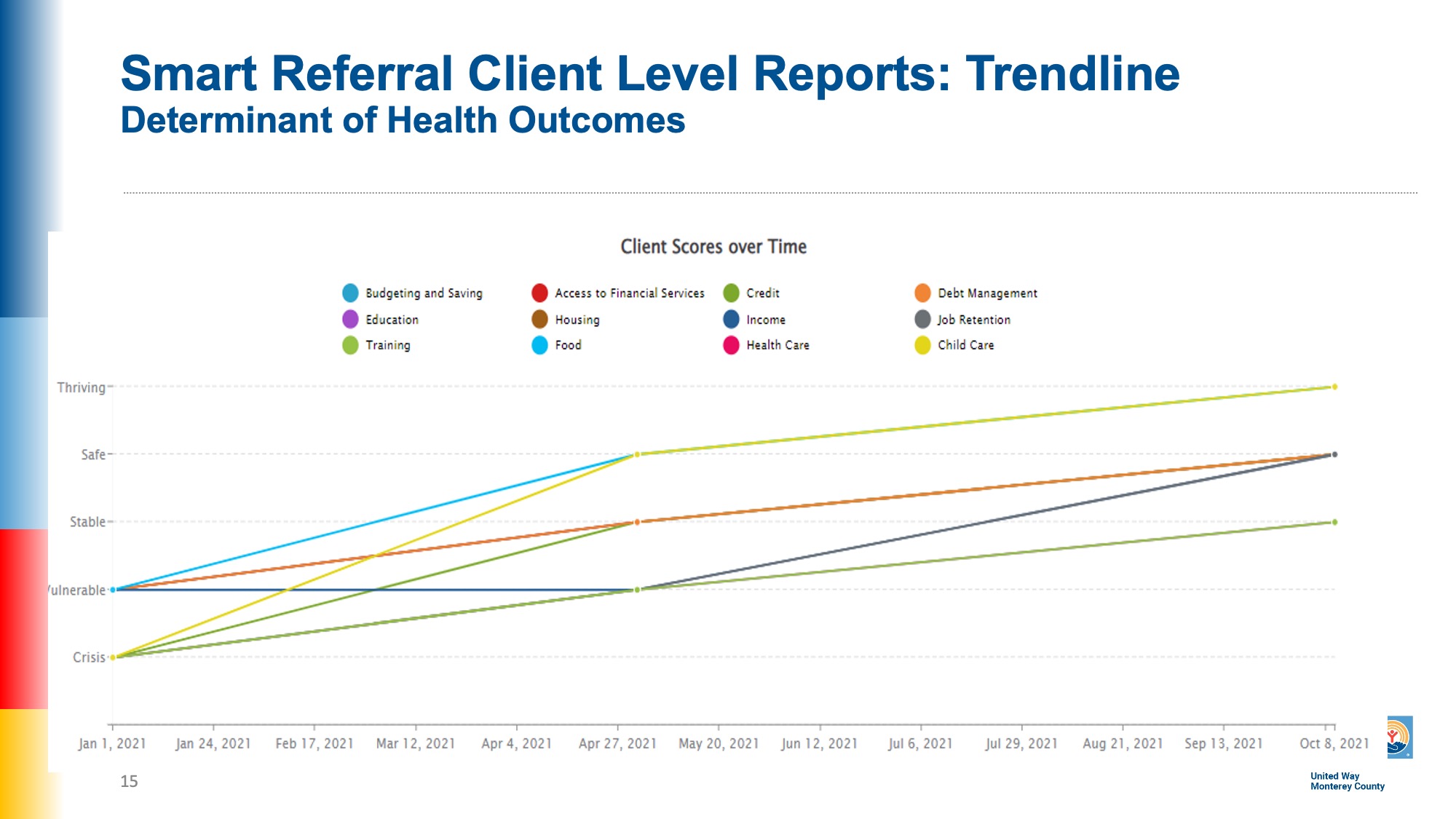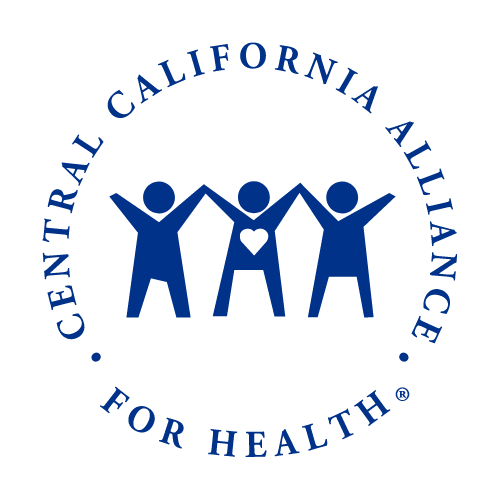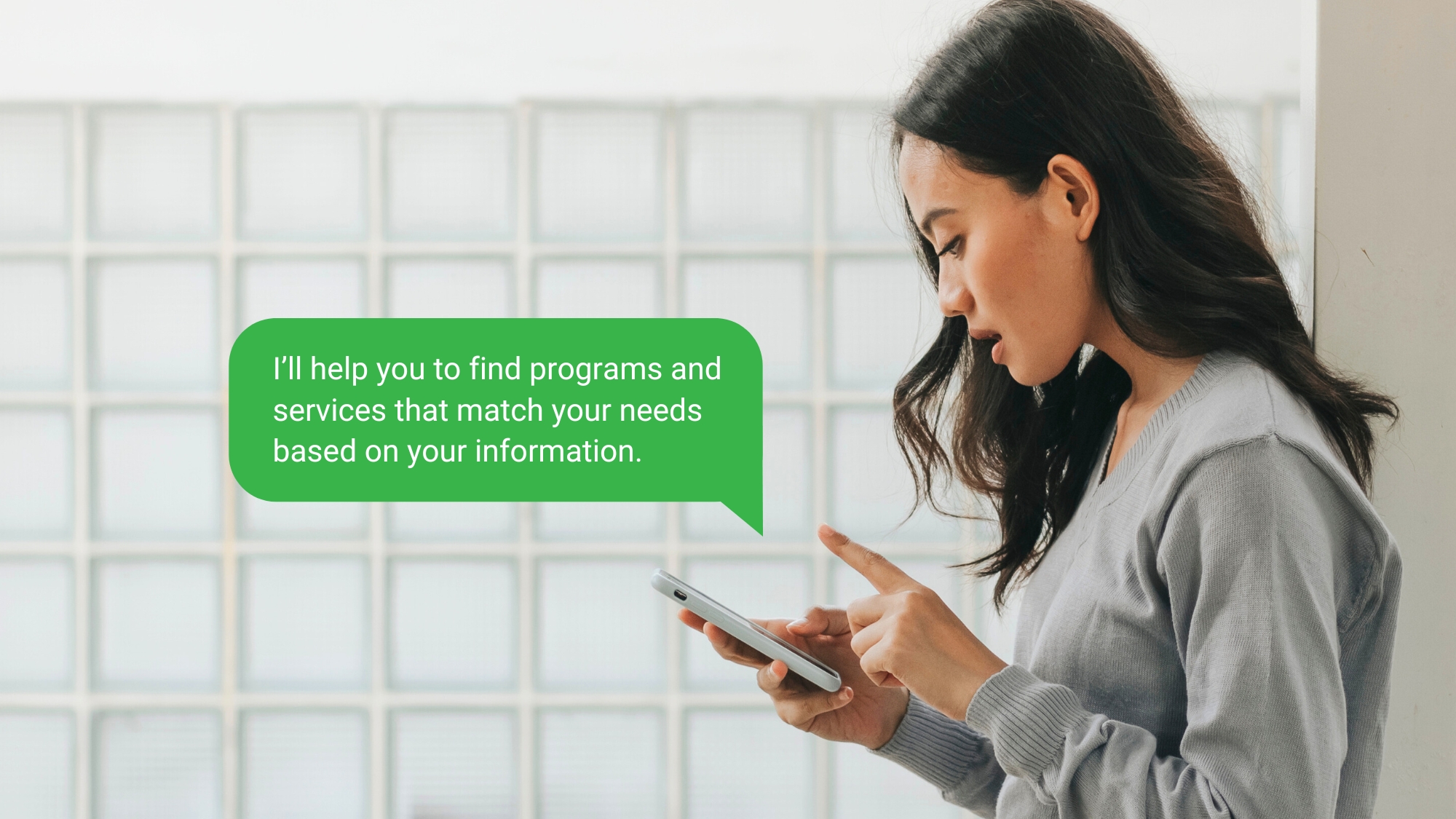
If you are a community member in Monterey County and are looking for programs and services,
please visit 211montereycounty.org.
ACCESS SERVICES, TRACK, AND REPORT ON REFERRAL OUTCOMES
83 PARTICIPATING AGENCIES HAVE SIGNED AGREEMENTS REPRESENTING 162 PROGRAMS AND 704 USERS.
The SRN allows users to make “closed loop” referrals. Case Managers, other front line workers, and residents in need of services use the program to identify needed services and enroll in them.
83
Participating Agencies
162
Smart Referral Network programs
30%
Enrollment Rate
17,047
Referrals Made
FEATURES

APPLICATIONS
For disaster relief, utility bill and rent assistance, MediCal programs

TARGET POPULATION SPECIFIC
Mental Health and Substance Use Disorders, Community Schools, People Experiencing Homelessness

REPORTS
Partners run reports on the Social Determinants of Health outcomes of services, referrals made and received, and referrals that result in services.
CHATBOT SELF-REFERRAL TOOL
United Way Monterey County has developed a chatbot that allows individuals to connect with more than 50 local agencies and hundreds of services.
AVAILABLE LIVE TRAINING AND TECHNICAL ASSISTANCE:
REFERRAL WORKFLOW, CARE MANAGEMENT, DATA COLLECTION, INTEGRATION, ANALYSIS AND CONSENT:
![]()
Design referral and care management workflows that support receiving, analyzing, and sharing client information while reducing administrative burden and errors.
![]()
Provide consultation on sending referrals to community benefit organizations for client enrollment in services.
![]()
Offer strategic support for data collection, exchange, management, and utilization. Support reporting of bi-directional closed-loop referral information and social determinants of health (SDOH) analytics to improve client level outcomes and population health management.
![]()
Support better connections for clients to access care, improving health outcomes, and care coordination effectiveness between cross functional community benefit organizations.
![]()
Support the development of cross database data integration tools and systems
![]()
Support with the collection of client consent and compliance with consent policies
TRAINING LEARNING OBJECTIVES:
- Gain knowledge in creating actionable workflow plans to make, receive, follow up and respond to referrals.
- Learn how to determine service needs for clients from local programs for which they are eligible, obtain client consent, and submit electronic referrals.
- Learn how to utilize chat bot self-enrollment tool that supports clients themselves to identify services and self-refer.
- Understand how to collaborate more effectively with local community benefit organizations on care plans.
- Learn how to document client interactions and manage cases and case files through the SRN.
- Understand how to document client referral and SDOH outcomes, analyze data, and leverage it to access clients to services and improve client SDOH outcomes.
No! The SRN is completely free for all 211 Monterey County partner agencies. It’s part of our shared mission to connect people, partners, and pathways to improve lives across Monterey County.
The Smart Referral Network is a secure, collaborative platform that allows agencies to send, receive, and track client referrals in real time—helping us better coordinate services and measure community impact.
The first step is to reach out to Jessica Sousa, SRN Coordinator. She can provide a quick demo or share all the information you need to decide if joining is right for your agency. Once your agency is ready, an MOU (Memorandum of Understanding) will be signed. This simple agreement outlines how we’ll work together to support clients through the SRN. After that, Jessica will set up your agency’s account with your programs and users. In some cases, your 211 intake form may need to be updated to ensure all active programs are represented in the system.
Jessica can tailor trainings specifically for your agency—virtually or in person. It’s hands-on support with Jessica live to answer questions and guide your team through the system. Her goal is simple: to make sure every agency is successful in the SRN.
Email Jessica directly, and she’ll help set up new accounts or schedule a refresher session for your team. You can also use the booking link in her email signature to schedule a training or troubleshooting session at a time that works best for you.
If something in the SRN isn’t working as expected—like a referral that won’t submit, a status that looks off, or a missing program—Jessica is just a message away. She can quickly jump on a video call to walk you through the issue in real time and show you exactly how to fix it. You’ll never have to worry about emails disappearing into a void—support is always personal and hands-on.
The SRN follows strict privacy and security standards to ensure client data is protected. Before any referral is made, clients must sign a consent form allowing their information to be shared with participating agencies. Consent is valid for one year, can be renewed for another year, or revoked at any time. If a client revokes consent, their personal information is immediately anonymized within the system.
Yes! You can track every referral in real time—from the moment it’s sent to when it’s accepted and completed—so you always know how your clients are progressing.
That’s completely fine! Some agencies primarily create referrals to connect clients to resources, while others mainly receive referrals to provide direct services. You can participate in the way that best fits your agency’s role—there’s no wrong way to use the SRN. Every connection strengthens the network.
The SRN saves time, improves communication between agencies, and ensures clients don’t fall through the cracks. It also provides valuable data to show how our collective efforts make a difference.
You’ll receive an email notification as soon as a new referral arrives in your SRN inbox. If that referral remains unaddressed, the system will send reminder emails to help keep things on track.
We recommend logging in weekly to review your active referrals and respond to updates. If a referral has been pending for more than a week, Jessica may reach out directly to help close the loop.
That’s okay! You can update your agency’s referral status or communicate capacity changes directly in the system or with Jessica—so everyone stays informed.
Yes! The SRN includes reporting tools that let you review referral trends, response times, and outcomes. Jessica can help you interpret your data and demonstrate how to use tools like pivot tables and filters to make your reports more useful. She’s here to help you turn data into insights that strengthen your impact.
Reach out to Jessica Sousa, SRN Coordinator, at (831) 318-1994. She’s happy to answer questions, take feedback, or explore ideas for making the SRN even better.
PARTICIPATING AGENCIES
ADULT EDUCATION
ASSET BUILDING & ACCESS TO COMMUNITY SERVICES
BASIC NEEDS/DOMESTIC VIOLENCE
Monterey County Family Justice Center, Holding on to Hope
CITIES
COUNSELING AND YOUTH
DISABILITIES
Central Coast Center for Independent Living
EARLY CARE AND EDUCATION
Community Action Partnership: SLO
FAMILY RESOURCES
Pajaro Valley Prevention and Student Assistance
FINANCIAL EDUCATION
FOSTER CARE
HEALTH CARE
Central Coast Alliance for Health
Helping Empower Reentry Services (HERS)
HOUSING RESOURCES
CHISPA**
IMMEDIATE NEEDS (FOOD, SHELTER, RENT, UTILITIES)
Center for Community Heath Engagement
Community Human Services (CHS)
Meals on Wheels: Salinas & Monterey
Salinas Valley Street Outreach Program
Salvation Army (Salinas & Monterey Corps)
LEGAL ASSISTANCE
MENTAL HEALTH
SENIORS
La Casa Adult Day Health Center
STUDENT SERVICES
Cal State University Monterey Bay
SUBSTANCE ABUSE
TRAINING
TRANSPORTATION
UTILITY ASSISTANCE
WORKFORCE DEVELOPMENT
* - Only Makes Referrals
** - Received referrals from precluded groups
MAKING A DIFFERENCE TOGETHER
Chris Torre’s story reflects the power of collective impact and how a community working together can make a difference in a family’s life. Mr. Torre, a single father with three children, found himself homeless after a series of unfortunate events. As is often the case, homelessness was not the only problem. The family also experienced unemployment, lack of child care, and food and transportation barriers.
Several agencies within the Active Referral Network (ARN), a collaborative administered and managed by UWMC, helped the Torre family get back on their feet. As a first step, Mr. Torre was referred to a Prosperity Planner with Goodwill Central Coast, who helped him find shelter and employment. Meanwhile, Castro Plaza Family Resource Center worked with the North Monterey County Unified School District to arrange child care and access to transportation. The Housing Resource Center helped the family move to a new home and provided them with beds and furniture. Additionally, the children were given new school supplies from UWMC’s Stuff the Bus program.
“Along the way I have met some of the most humble people, who always went above and beyond their job descriptions. United Way Monterey County and Castroville Family Resource Center treated me and my kids like family. Thank you for all you guys do. I’ll forever be grateful” —Chris Torre
The Torre family is now in a permanent home and the children are attending school and thriving. They are grateful for the support provided by United Way and its partners and recognize the value of having a robust community network to rely on to ensure that they remain on their path to financial stability.
LET'S GET STARTED
Let our team show you how Activate Care could help you
bring whole person care to life in your community.
SCHEDULE AN INTRODUCTION

"The results of our collaborative efforts mean we have increased capacity within workflows to navigate referrals and coordinate care as well as to document, use, and share SDOH outcomes. Provider teams are better able to make care decisions for individuals, and our community leaders are better able to design broader population health strategies using aggregate data. Individuals in our community with the most significant complexities are benefiting from this partnership."
Stephanie Sonnenshine
Chief Executive Officer
Central California Alliance for Health

